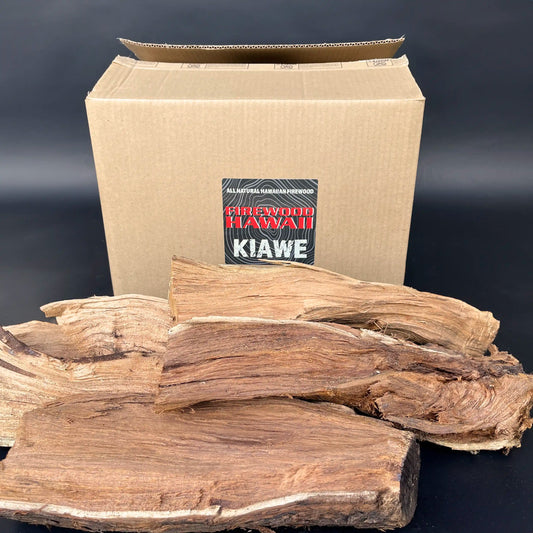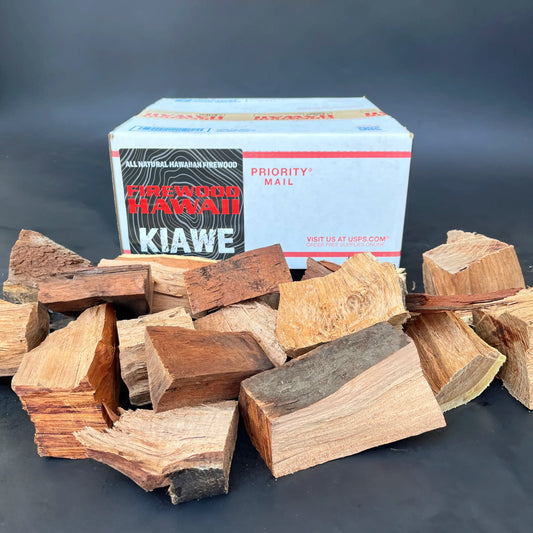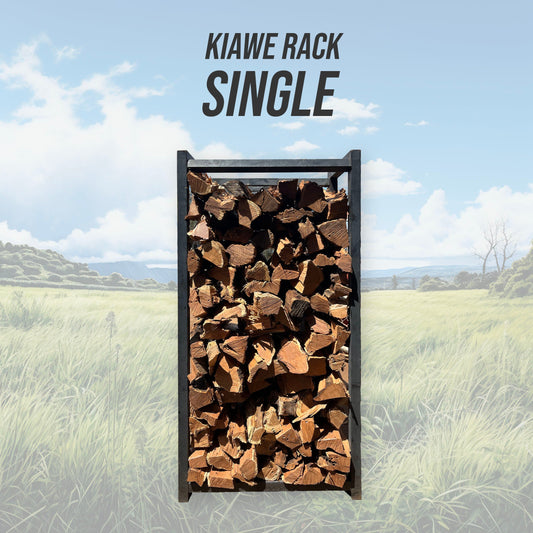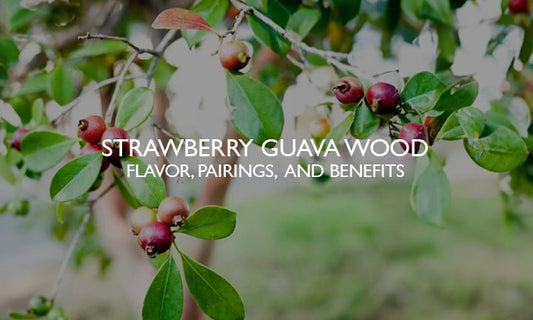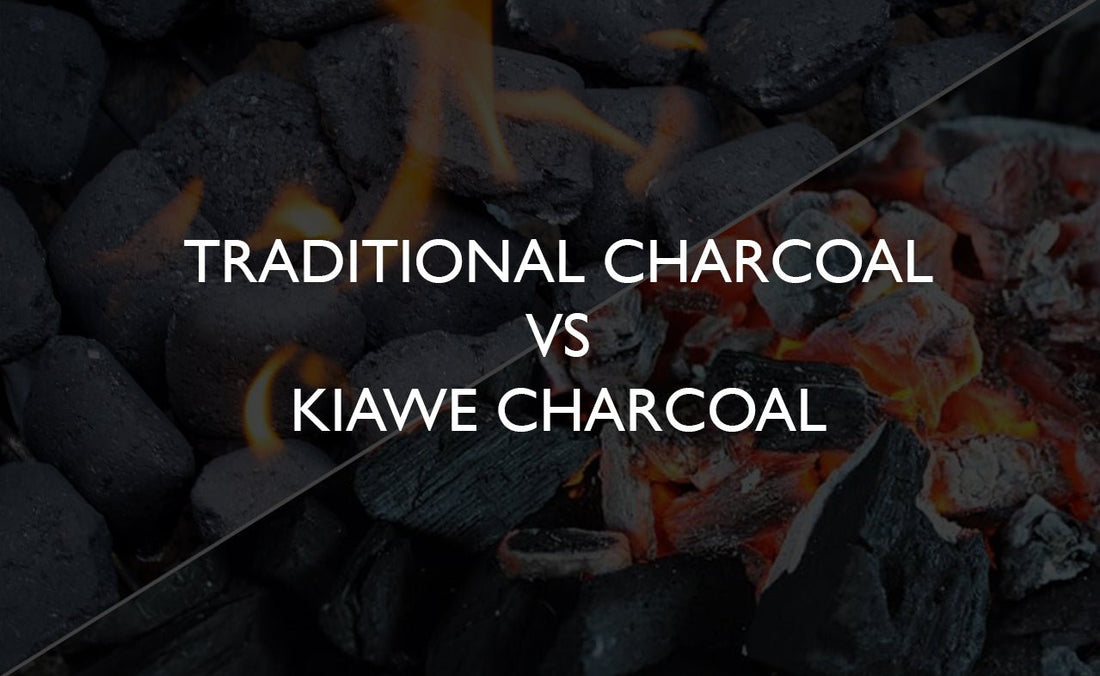
Kiawe Charcoal vs. Traditional Charcoal: Which is Right for You?
Share
When it comes to charcoal for cooking, there are several options available.
Traditional charcoal has been a staple for many years, but there's a newcomer in town: Kiawe charcoal.
Derived from the kiawe tree, native to Hawaii, kiawe charcoal offers unique characteristics that set it apart from traditional charcoal.
Understanding Kiawe Charcoal
The kiawe tree is a thorny legume tree native to Hawaii, known for its dense, high-quality wood.
Kiawe charcoal is produced through a meticulous process that starts with harvesting mature kiawe wood.
The wood is then burned in a controlled environment, using a carbonization technique that transforms it into charcoal while retaining its natural properties.
This process ensures that the resulting kiawe charcoal is dense, long-lasting, and of premium quality.

Kiawe charcoal imparts a distinct and aromatic smoky flavor to grilled food, contributing to a unique culinary experience. The flavor profile of kiawe charcoal is often described as bold, slightly sweet, and reminiscent of the tropical Hawaiian islands.
This rich flavor adds depth to various dishes, from juicy steaks and seafood to vegetables and fruits.
Exploring Traditional Charcoal
Traditional charcoal comes in various forms, such as briquettes and lump charcoal.
Briquettes are made by compressing charcoal dust or small pieces of charcoal with additives and binders, resulting in uniform shapes and sizes.
Lump charcoal, on the other hand, is made from chunks of natural hardwood that are burned until they become charcoal.

One key characteristic of traditional charcoal is its versatility and availability.
It can be found in most stores that carry grilling supplies, making it easily accessible for consumers.
Traditional charcoal also tends to be more affordable compared to kiawe charcoal, which is imported from Hawaii.
When it comes to cooking properties, traditional charcoal provides consistent heat and a reliable burn.
It is suitable for various grilling techniques, such as searing, direct grilling, and indirect grilling.
However, the flavor profile of traditional charcoal is relatively neutral compared to kiawe charcoal, offering a classic smoky taste that many are familiar with.
Benefits of Kiawe Charcoal
Kiawe charcoal offers several distinct benefits that make it a popular choice among grilling enthusiasts:
High heat and long burn time
Kiawe charcoal is known for its exceptional heat output.
It can reach high temperatures quickly, making it ideal for searing steaks and achieving a perfect char on grilled food.
Additionally, kiawe charcoal has a long burn time, allowing for extended cooking sessions without the need for frequent refueling.
Low ash production
Compared to traditional charcoal, kiawe charcoal produces minimal ash during the grilling process.
This not only makes cleanup easier but also reduces the risk of ash interfering with the airflow and heat distribution in your grill.
Natural and sustainable
Kiawe charcoal is made from renewable and sustainable sources.
The kiawe tree grows abundantly in Hawaii and is considered an invasive species, so harvesting it for charcoal production helps manage its population.
By choosing kiawe charcoal, you can enjoy your grilling sessions while minimizing your impact on the environment.
Considerations for Choosing the Right Charcoal
To determine which type of charcoal is right for you, consider the following factors:
Flavor preferences
Kiawe charcoal can add an exciting and tropical twist to your dishes, while traditional charcoal offers a classic grilling experience.
Cooking styles
If you enjoy searing steaks and achieving a perfect char, kiawe charcoal's high heat output makes it a great option.
Traditional charcoal, with its versatility, is suitable for a wide range of grilling methods, including slow smoking and indirect grilling.
Accessibility and availability
While traditional charcoal can be found in most stores, kiawe charcoal may require more effort to obtain, as it is typically imported from Hawaii.
Consider if the unique qualities of kiawe charcoal outweigh the convenience of easily accessible traditional charcoal.
Both kiawe charcoal and traditional charcoal have their merits and offer unique benefits for grilling enthusiasts. Kiawe charcoal brings a distinct tropical flavor and is known for its high heat output and low ash production. Traditional charcoal, on the other hand, offers familiarity, versatility, and widespread availability.
Ultimately, the choice between kiawe charcoal and traditional charcoal depends on your personal preferences, cooking style, and the availability of kiawe charcoal in your area.
Consider experimenting with both types to explore the diverse flavors and experiences they offer. Whether you decide to embrace the smoky essence of kiawe charcoal or stick with the traditional charcoal you know, enjoy the process of exploring and enhancing your culinary creations.
Happy grilling!
More information about Kiawe Charcoal - Benefits and Food Pairings
Read more About Kiawe Wood



